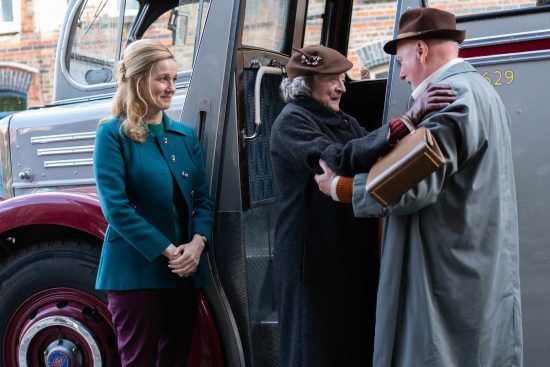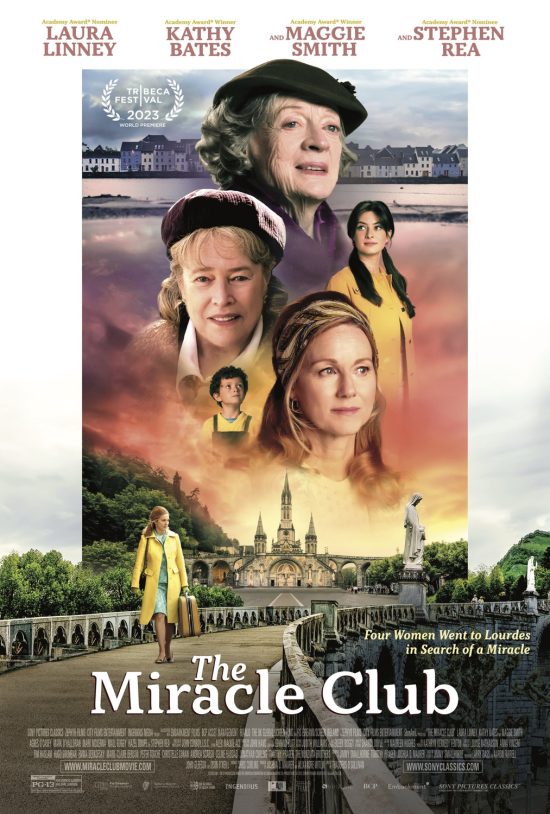Review: The Miracle Club – “Clearly a labour of love”

Courtesy SONY PICTURES CLASSICS
Inevitably, at some point in our lives, no matter how strong we are, no matter our religious inclination, we might hope (and some might pray) for a miracle. It might be for a path out of a sticky situation, medical intervention for a loved one or help to mend a relationship. We tend to look for miracles when our hearts need guidance or healing, when we’ve tried everything else. This is the case for the four women at the heart of The Miracle Club, though it’s perhaps the journey to the miracle itself that becomes the most significant.
That journey comes as a trip from 1967 Dublin to Lourdes, in the Pyrenees mountains of southwest France. There stands the Sanctuary of Our Lady of Lourdes, a popular place of pilgrimage for Catholics hoping to find their miracle in the alleged healing powers of the water that flows through the site’s grotto. For Dolly (Agnes O’Casey) she hopes the journey will help her son finally speak his first words. Eileen (Kathy Bates) has found a lump on her breast and feels more faith in the Lord to heal her than doctors. Lily (Maggie Smith) realizes that her chance to fulfil her lifelong dream of going to Lourdes is running out, along with a chance to assuage heavy guilt she feels from her past.
When the three generations of friends win the opportunity to head to the religious site in a talent show (second place is a joint of ham!), they hop on board the bus outside the church with enthusiasm, leaving the men in their lives to fend for themselves. But on that bus is also Chrissie (Laura Linney), who has returned from Boston after a nearly 40-year exile. She’s a skeptic, who is only really taking the place of her recently deceased mother, but along the way she’s looking for answers, hoping to confront the trauma of their collective past.
The Miracle Club, directed by Irish filmmaker Thaddeus O’Sullivan, is a film that is firmly centred around religion that also works hard to avoid alienating those who are not religious. It’s more about the people and their relationships with one another. In the heavily Catholic Ireland of the mid-1960s the religion’s influence on these women could not be ignored. Yet, it’s their journey to this religious icon that is truly the focus. It makes them examine their own previous actions within the context of their beliefs and also awards them some needed independence.
The Miracle Club shows the peace, serenity and hope found in faith. But, it also isn’t afraid to comment, albeit briefly, on the contradictions of Lourdes itself, a highly touristic place selling all sorts of religious paraphernalia; snow globes, statues of the Virgin Mary and various other trinkets amongst the backdrop of what often becomes false hope. “You don’t come to Lourdes for a miracle. You come for the strength to go on when there is no miracle,” says the women’s accompanying priest (an affable Mark O’Halloran).
The award-winning stars of The Miracle Club are truly the ones doing the heavy lifting here. Their characters’ conflicts seem much too simply resolved for the complexity of their relationships. Smith, Bates, Linney and O’Casey make each woman shine and it’s their determination and effort that make them truly endearing. Their strength is what becomes most evident, especially considering a woman’s role during this time period. They were expected to keep house, take care of the children, cook meals, and do the heavy lifting while their husbands worked or went to the pub. It’s only in their absence that the men all discover (especially in the case of Stephen Rea’s character) that they can’t do the heavy lifting at all – especially when that lifting is groceries.
The film, in development for nearly two decades in various iterations, is clearly a labour of love, beautifully shot and with wonderful costume design by Judith Williams, especially in the case of Linney’s wardrobe. It just lacks the emotional impact that would make it truly special (and awards material). Whether that’s just in a lack of real climactic resolution or just subject matter alone, it isn’t for lack of trying. The Miracle Club isn’t miraculous in itself, but is a firm reminder of the power of faith, whether in a higher power or in our relationships. Perhaps, like the characters of the film, we might not always get exactly what we had hoped, but each walks away with a miracle of their own all the same.

The Miracle Club premiered at the Tribeca Film Festival. It releases in North American theatres July 14th, and with a September release date in the UK.










